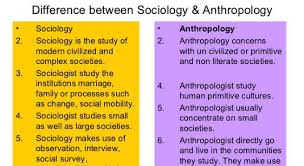Relationship Between Social Anthropology And Sociology – Anthropology Notes – For W.B.C.S. Examination.
The historians are more interested in particular sequences of past events. Anthropologists are centrally interested in understanding the present conditions of culture or community which they are studying. But the two disciplines have a close relationship. Both history and ethnography (the empirical description of a people on which the cross-cultural comparison technique is applied for the extraction of anthropological theories) are concerned with societies other than the one in which the researcher live. Whether this otherness is due to remoteness in time, or to remoteness in space, or even to cultural heterogeneity, is of secondary importance compared to the basic similarity of prospective. The historian or ethnographer enlarges a specific experience to the dimensions of a more general one, which thereby becomes accessible as experience to men of another country or another epoch. And in order to succeed, both historian and ethnographer must have the same qualities: skill, precision, a sympathetic approach and objectivity (Levi-Strauss 1963: 17).Continue Reading Relationship Between Social Anthropology And Sociology – Anthropology Notes – For W.B.C.S. Examination.
John Beattie (1964) mentions that history may be important to social anthropologists; not only as an account of past events leading up to and explaining the present, but also as a body of contemporary ideas which people have about these events, what the English philosopher Collingwood aptly called ‘encapsulated history’. People’s ideas about the past are an intrinsic part of the contemporary situation which is of immediate concern to the anthropologists, and often they have important implications for existing social relationships.
About the fundamental difference between the two disciplines, Levi-Strauss also writes that it is not on the subject of study or goal or method because, they share the same subject, which is social life; the same goal, which is a better understanding of man; and, in fact, the same method, in which only the proportion of research techniques varies. They differ, principally, in their choice of complementary perspectives: history organizes its data in relation to conscious expressions of social life, while anthropology proceeds by examining its unconscious foundations.
Although historians use documentary evidence infrequently available to anthropologists, and anthropologists employ first-hand observation rarely possible for historians, both are concerned with the description and understanding of rear human situations, and they use whatever methods are available and appropriate to this purpose. Like historians, a social anthropologists brings out a general interpretation. Both anthropologist and historians attempt to represent unfamiliar social situations in terms not just of their own cultural categories but in terms of the categories of the actors themselves.
In this regard we can see the writing of John Beattie again. He suggests that the main difference between anthropology and history lie not so much in their subject matter, as in the degree of generality with which they deal with it. He writes, “Historians are interested in the history of particular institutions in particular places, parliament in England, for example, or the Hapsburg monarchy. But they are also concerned, implicitly if not explicitly, with the nature of these institutions themselves. Equally, a social anthropologist who is concerned with, say, the role of chiefs in a particular society must play the historian to the extent of telling us something about the careers and activities of individual chiefs. Unless he does this, we shall find his account empty, formal and unconvincing. So, although in a general sense it is true that historians are concerned with what is individual and unique, social anthropologists, like sociologists, with what is general and typical, this dichotomy is altogether too simple. As so often in the social sciences, the difference is largely one of emphasis.” (John Beattie op. cit. 25).
Our own publications are available at our webstore (click here).
For Guidance of WBCS (Exe.) Etc. Preliminary , Main Exam and Interview, Study Mat, Mock Test, Guided by WBCS Gr A Officers , Online and Classroom, Call 9674493673, or mail us at – mailus@wbcsmadeeasy.in
Visit our you tube channel WBCSMadeEasy™ You tube Channel
Please subscribe here to get all future updates on this post/page/category/website



 Toll Free 1800 572 9282
Toll Free 1800 572 9282  mailus@wbcsmadeeasy.in
mailus@wbcsmadeeasy.in


















































































































